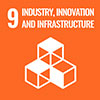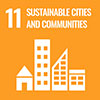Metropolitan avenues
The development of segregated road infrastructures in the Metropolitan Area of Barcelona has generated high demand of traffic and the negative externalities associated with this. It has also conditioned the urban metropolitan structure and generated significant infrastructural barriers. It is as necessary to promote physical channels of priority for sustainable transport as it is to connect the city on a more human scale. This article presents some of the initiatives of the Metropolitan Area of Barcelona (AMB) for achieving this, particularly a network of metropolitan avenues as a structure for boosting sustainable transport and connecting the metropolitan city. The conceptualization of this network is explained, along with its implications at both a local level and a metropolitan/regional level with its coordination with segregated roads.
ODS



 Javier Ortigosa Marín
Javier Ortigosa MarínRoad Engineer from the UPC, master’s in Transport and Logistics from Chalmers University, doctorate in Traffic Engineering from ETH Zurich. Specialist in traffic networks and operations. Coordinates topics of transport and infrastructure for the Editorial Service Urban Metropolitan Management. Professor in sustainable transport at the UPC.
 Maite Pérez Pérez
Maite Pérez PérezRoad Engineer from the UPC and master’s in Supply Chain Management from ICIL. She developed her career in transport and mobility service planning and its interaction with urbanism, ecology and social aspects. Currently works in the management of Sustainable Transport Service with the AMB.
 Lluís Pretel Fumadó
Lluís Pretel FumadóArchitect from the ETSAB-UPC and post-graduate in Geospatial Analysis from the UdG. Currently studying for a master’s in City and Urbanism at the UOC. Specialist in the analysis of urban data and urbanistic systems. Part of the Editorial Service Urban Metropolitan Management team. Associate professor with the ETSECCPB at the UPC.



